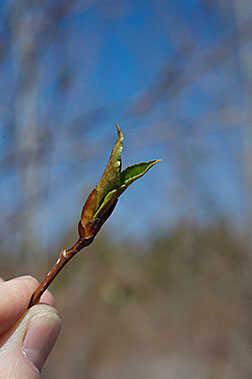- Number 421 |
- September 1, 2014
Finding fingerprints of selection in poplars

A poplar shoot.
Since the publication of the poplar genome by the U.S. Department of Energy Joint Genome Institute (DOE JGI) in 2006, it has been used to understand woody perennial plant development and served as a model for genome-level insights in forest trees. In a recent study published online August 24, 2014 in Nature Genetics, a team led by Gerald Tuskan of Oak Ridge National Laboratory (ORNL) and the DOE JGI – a DOE Office of Science user facility – and Stephen DiFazio of West Virginia University used a combination of genome-wide selection scans and analyses to understand the processes involved in shaping the genetic variation of natural poplar (Populus trichocarpa) populations.
“This is the first time that deep genomics resources have ever been applied to an ecological question, in this case: ‘What does selection do at the genome level?’” said Tuskan. “In the past, people looked at adaptation to factors such as temperature and light levels, and they examined variation in those genes as they vary across environmental gradients. There was a preconceived notion and a very narrow view of what was causing the response. Here, we took five major approaches, applied them blindly to the whole genome, and let the analysis show us where the fingerprints of selection are and what genes fall under those fingerprints.” Watch a video of Tuskan on the importance of selection in trees at http://bit.ly/Tuskan14fingerprints.
The work offers a more in-depth, population-based approach to identifying such mechanisms for adaptation, and describes a method that could be harnessed for developing more accurate predictive climate change models. For the U.S. Department of Energy, which is developing biomass crops for biofuels production, this knowledge could determine which genotypes – genetic makeup of an organism – of biomass crop may thrive better than others in certain environments. Read more at http://jgi.doe.gov/signatures-selection-inscribed-poplar-genomes/.[Massie Ballon, 925.927.2541,
mlballon@lbl.gov]
